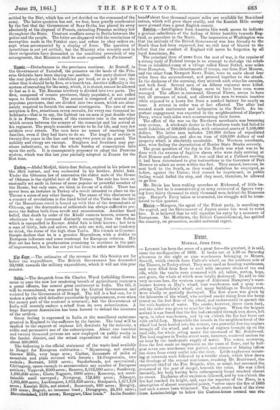ifituisiQ,—Disturbances in the provinces continue. At Rostoff, in the Government
of Yarosloff, the peasants on the lands of the Prin- cess Gelatzin have been slaying one another. One party desired that the rent (obroc) should be calculated per head, or as a poll tax; the other that it should be by fires, or a hearth tax. Another difficulty is the system of recruiting for the army, which, it is stated, cannot be allowed to last as it is. The Russian territory is divided into two parts. The first, composed of remote provinces, thinly populated, is not called upon to furnish recruits. The second is composed of central and populous provinces, that are divided into two zones, which are alter- nately required to furnish the annual contingents. The rate of con- scription is five, sometimes seven recruits, for every one thousand in- habitants—that is to say, the lightest tax on men is just double what it is in France. The reason of this excessive rate is the mortality which occurs between the seizure of the conscript and his arrival at his regiment. The people consider service to be for life, and very few soldiers ever return. The men have no means of reaching their families, even if they had leave to do so. The length of service is twenty-five years in the line and twenty-two years in the guard. The nobility and clergy are exempt. Burghers and freedmen may pur- chase substitutes, so that the whole burden of conscription falls upon the serfs. It is consequently proposed to adopt the Prussian system, which was this last year partially adopted iu France for the first time.






























 Previous page
Previous page